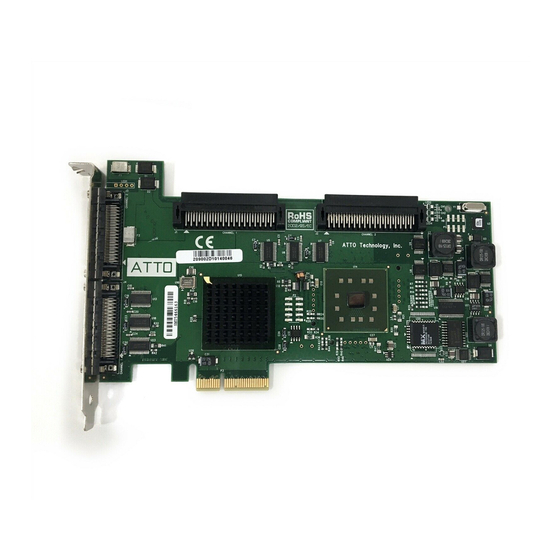ATTO Technology ExpressPCI UL5D LP 문제 해결 매뉴얼 - 페이지 8
{카테고리_이름} ATTO Technology ExpressPCI UL5D LP에 대한 문제 해결 매뉴얼을 온라인으로 검색하거나 PDF를 다운로드하세요. ATTO Technology ExpressPCI UL5D LP 12 페이지. Single channel ultra320 scsi, pci-x host adapter dual channel ultra320 scsi, pci-x host adapter dual channel ultra320 scsi, pci express host adapter dual channel ultra320 scsi, low-profile pcie host adapter
ATTO Technology ExpressPCI UL5D LP에 대해서도 마찬가지입니다: 기술 사양 (2 페이지), 호환성 차트 (1 페이지), 설치 및 운영 매뉴얼 (19 페이지)

On certain 64-bit platforms, the driver Makefile may be unable to detect the
correct CPU architecture. When compiling the driver, an error such as
"cc1 : error : CPU you selected does not support x86_64 instruction set".
This can be resolved by specifying the correct architecture when running the
make command. For example: $make install ARCH=x86_64
The connected SCSI devices aren't detected by the operating system.
Verify the driver is loaded by examining the output of the Ismod command for
"express2".
Check /proc/scsi/scsi to see a list of devices that are known by the operating
system. This will only list the device at LUN 0 and it's negotiated speed.
The UL5D host adapter is recognized, but it does not detect any of the connected
SCSI devices. The command dmesg can be used to see what devices are detected
when the driver loads. It will list each device per SCSI bus.
Verify the SCSI devices are powered on.
Check the SCSI devices to make sure that they are all set to different SCSI ID's.
Each device on each SCSI bus must use a unique ID, including the host adapter.
Devices on Bus 1 can have the same IDs as those on Bus 2. By default, the host
adapter uses SCSI ID 7, so devices should use ID's 0 through 6, or 8 through 15.
Check cable integrity. Check the cables for solid connections. Make sure they
are screwed down. Inspect cable ends for bent pins. U320 SCSI requires high
quality cables that are specifically rated for the U320 transmission speeds.
Verify the external terminator is the same SCSI type as the devices (certified as
usable for Ultra320 SCSI or lower) and does not have damaged pins.
Try attaching SCSI devices one at a time with different cables, adding drives and
cables until the problem occurs. This will help pinpoint the device or cable
causing the problem.
Watch the LED indicators on the SCSI devices before, during, and after startup.
Drive lights should also flash at startup as the SCSI bus is scanned. This may
give a clue as to the root cause of the issue.
Try putting the host adapter in a different PCI slot.
Try updating the firmware on the host adapter as described in the "Installation
and Operations" manual.
If all else fails, replace the SCSI host adapter.
The computer recognizes the UL5D host adapter, but only detects connected
SCSI devices on one of the busses. The other bus reports no devices. The command
dmesg can be used to see what devices are detected on each SCSI bus.
Swap the devices and cables from the SCSI bus that appears to be working with
the one having issues. If the issue follows the bus, replace the SCSI host
adapter.
Page 8 of 12
Atto Technology, Inc.
January 19, 2007
